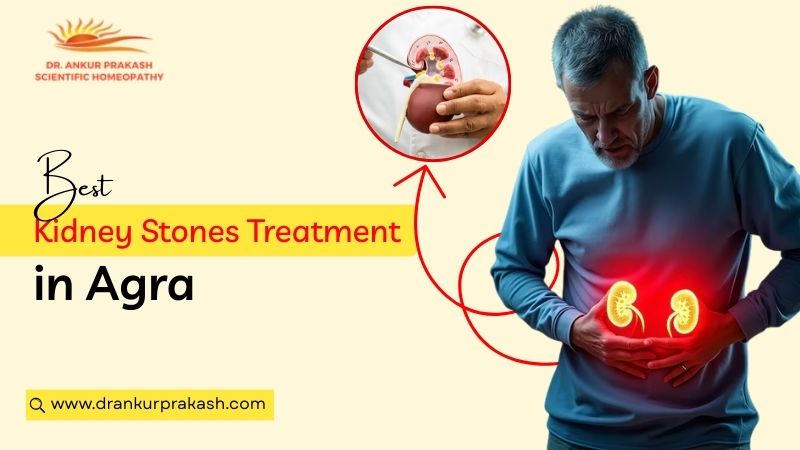Stomach pain is a common health concern that can result from various factors such as indigestion, gas, acidity, food intolerance, infections, stress, or digestive disorders. While occasional stomach discomfort may resolve on its own, recurring or persistent pain can interfere with daily activities and may indicate an underlying digestive imbalance that requires proper medical attention.
Homeopathic treatment for stomach pain focuses on treating the root cause through natural, individualized medicines. Under the guidance of Dr. Ankur Prakash, this gentle and holistic approach helps relieve pain, improve digestion, and support long-term digestive health without harmful side effects.
Stomach Pain & Abdominal Pain
Stomach pain and abdominal pain are commonly used terms for discomfort felt in the mid to lower abdomen. The intensity and duration can vary from mild and temporary to severe and persistent, affecting people of all ages and lifestyles.
Stomach and abdominal pain may present as:
- Dull or aching discomfort
- Sharp or stabbing pain
- Cramping or bloating
- Recurrent or persistent pain
Such symptoms may result from minor digestive issues or underlying health conditions, and persistent pain should not be ignored.
Homeopathic Treatment for Stomach Pain
Homeopathic treatment for stomach pain offers a gentle, natural, and holistic approach to managing digestive discomfort. Instead of providing temporary relief, homeopathy focuses on identifying the root cause of stomach and abdominal pain and treating it through individualized remedies. This approach supports the body’s natural healing process and is safe for children, adults, and the elderly.
Key benefits of homeopathic treatment for stomach pain include:
Natural, side-effect-free remedies
Personalized treatment based on symptoms
Suitable for chronic and recurring stomach pain
Improves digestion and overall gut health
Under the guidance of Dr. Ankur Prakash, patients receive personalized homeopathic care tailored to their specific digestive concerns. Consulting an experienced homeopathic doctor ensures accurate diagnosis, effective treatment, and long-term digestive balance.
Types of Stomach Pain
Various types of discomfort can affect the stomach area, each characterized by different sensations and often linked to specific conditions. These include:
Aching Pain: Commonly associated with non-serious issues like indigestion or gas, this dull, persistent soreness often resolves with simple treatments or dietary adjustments.
Cramping: This type of discomfort occurs in waves, often sudden and severe, and can be caused by food poisoning, gastroenteritis, or menstrual cycles in women.
Sharp Pain: Intense and piercing, this can indicate more serious conditions such as ulcers, gallstones, or even appendicitis, requiring immediate medical attention.
Burning Sensation: Often related to acid reflux or gastritis, where acid irritates the stomach lining.
Abdominal Pain Causes
Abdominal pain can occur due to various digestive, lifestyle, and medical reasons. The nature of pain—mild, severe, sudden, or persistent—often depends on the underlying cause. Understanding these causes helps in choosing the right treatment approach.
-
Indigestion, acidity, and gas – Often caused by overeating, spicy foods, or irregular meal timings, leading to burning sensations, bloating, or discomfort.
-
Constipation or bloating – Hard stools or trapped gas can create pressure in the abdomen, resulting in pain and heaviness.
-
Food intolerance or food poisoning – Difficulty digesting certain foods or consuming contaminated food may trigger cramps, nausea, or diarrhea.
-
Gastritis and acid reflux – Inflammation of the stomach lining or acid backflow can cause upper abdominal pain and burning sensations.
-
Intestinal infections – Bacterial or viral infections may lead to abdominal cramps, loose motions, and weakness.
-
Stress and anxiety – Emotional stress can disrupt digestion, causing stomach tightness, pain, or irregular bowel movements.
-
Irritable Bowel Syndrome (IBS) – A chronic digestive condition associated with recurring abdominal pain, bloating, constipation, or diarrhea.
-
Menstrual-related abdominal cramps – Hormonal changes during menstruation can cause lower abdominal pain and discomfort in women.
If abdominal pain becomes severe, frequent, or persistent, medical evaluation is important to rule out serious conditions and ensure proper treatment.
How Common is Stomach Pain?
Stomach pain is a common ailment that affects people of all ages, from children to adults. It is one of the most frequent reasons for visits to the doctor. Stomach pain can range from mild and intermittent to severe and chronic, depending on the underlying cause. Common causes include indigestion, gas, constipation, stomach virus, food poisoning, and stress-related conditions. More serious conditions such as ulcers, gallstones, and appendicitis can also lead to Abdominal pain.
Prevention: Tips to Avoid Stomach Discomfort

Preventing stomach discomfort starts with simple lifestyle choices that support a healthy digestive system. By adopting the habits below, you can significantly reduce bloating, pain, and indigestion.
Maintain a Balanced Diet: Choose a nutritious, well-balanced diet rich in fiber, fresh fruits, vegetables, whole grains, and lean proteins. Fiber aids digestion, supports gut health, and helps prevent constipation and discomfort.
Stay Well Hydrated: Drinking enough water throughout the day is essential for proper digestion. Adequate hydration helps break down food, supports nutrient absorption, and prevents digestive issues such as bloating and constipation.
Control Portion Sizes: Avoid overeating by consuming smaller, more frequent meals. This reduces strain on the digestive system and helps prevent gas, acidity, and stomach pain.
Identify and Limit Trigger Foods: Certain foods can irritate the stomach. Common triggers include spicy foods, fatty or fried items, caffeine, and highly processed foods. Pay attention to your body and avoid foods that worsen your symptoms.
Engage in Regular Physical Activity: Regular exercise stimulates digestion and promotes healthy bowel movements. Even light activities like walking or stretching can help reduce bloating and improve overall gut function.
Manage Stress Effectively: Stress has a direct impact on digestive health. Practices such as meditation, yoga, deep breathing, and adequate sleep can calm the nervous system and prevent stress-related stomach discomfort.
Avoid Smoking and Limit Alcohol Intake: Smoking and excessive alcohol consumption can irritate the stomach lining and disrupt digestion. Reducing or eliminating these habits helps protect your digestive tract and improves long-term gut health.
Best Homeopathic Medicine for Stomach Pain
Finding the best homeopathic medicine for stomach discomfort depends on the specific symptoms and underlying causes. Here are some commonly recommended options:
Nux Vomica: Commonly considered when stomach pain follows overeating, alcohol intake, or indigestion. It may help ease abdominal cramps, nausea, and a feeling of heaviness after meals.
Pulsatilla: Often suited for individuals who experience digestive discomfort after eating rich or fatty foods. It is also associated with digestive symptoms linked to emotional stress or mood changes.
Carbo Vegetabilis: Typically recommended when bloating, excessive gas, and abdominal fullness occur after meals, especially when there is noticeable flatulence.
Colocynthis: Known for addressing intense abdominal cramping that causes a person to bend forward for relief, with symptoms that may improve through firm pressure or warmth.
Arsenicum Album: Useful for pain accompanied by anxiety and restlessness, especially beneficial for food poisoning symptoms.
Disclaimer: It is essential to consult with the Best Homeopathy Doctor in India to determine the most appropriate remedy based on individual symptoms and health history. This personalized approach ensures the treatment targets specific issues for more effective relief.
Can We Take Homeopathic Medicine Empty Stomach?
Taking homeopathic medicine on an empty stomach is generally recommended because it helps the remedy absorb better without interference from food, strong flavors, or drinks. It allows faster action and improved results. For issues like digestion discomfort, Homeopathic Medicine for Stomach Pain can work more effectively when taken before meals as advised by a qualified homeopathic doctor.
Can a Gastric Ulcer Cause Stomach Pain?
Yes, a gastric ulcer can definitely cause stomach pain. It occurs when the stomach lining gets damaged, leading to burning pain, acidity, bloating, and discomfort, especially after meals. If left untreated, ulcers may worsen and cause bleeding or digestion issues. Along with proper medical evaluation, homeopathy gastric medicine can help relieve pain, reduce acidity, support healing of the stomach lining, and address the root cause naturally for long-term relief.
In conclusion
While stomach pain can be distressing, identifying the appropriate homeopathic remedy can offer significant relief by addressing the unique aspects of each individual’s symptoms. From Nux Vomica for indigestion to Arsenicum Album for severe discomfort associated with anxiety, homeopathy provides a range of options tailored to different needs. For those seeking more personalized advice or facing persistent symptoms, consulting with a homeopathic doctor is advisable. If you need more details or specific guidance tailored to your condition, consider consulting with a homeopathic doctor in Agra to explore the best treatment options for you.








